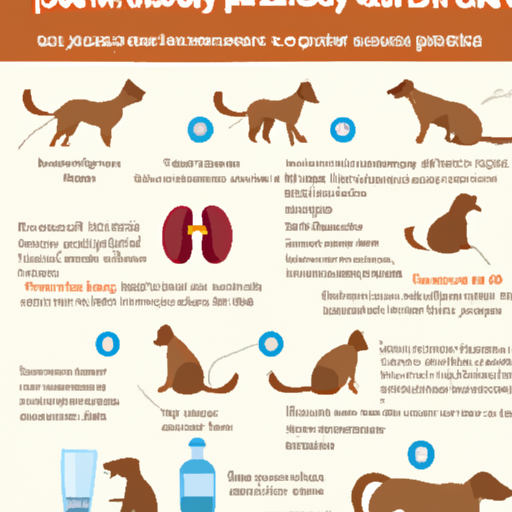Kidney failure in dogs is a complex health issue that requires immediate attention. As a caregiver, your vigilance plays a critical role in early detection, which can significantly impact your dog’s prognosis. This guide will help you understand the symptoms of kidney failure, its potential causes, diagnosis, and treatment options.
1. Understanding Kidney Failure
Before we delve into the symptoms, it’s crucial to understand what kidney failure in dogs entails. Kidney failure, also known as renal failure, is a condition where a dog’s kidneys are unable to adequately remove waste products from the bloodstream. This condition can be acute or chronic:
-
Acute kidney failure: This is a sudden decline in kidney function, often caused by toxins, certain medications, and severe dehydration.
-
Chronic kidney failure: This is a long-term condition that tends to develop over months or years. It’s often a result of aging or a persistent disease affecting the kidneys.
2. Symptoms of Kidney Failure
Kidney failure can manifest in several ways in dogs. Below is a list of the most common symptoms:
-
Excessive thirst and urination: As the kidneys struggle to filter waste, your dog might consume more water and urinate frequently.
-
Loss of appetite and weight loss: Dogs with kidney failure often show a decreased interest in food, leading to significant weight loss over time.
-
Vomiting and diarrhea: These symptoms occur as a result of the accumulation of toxins in the bloodstream.
-
Bad breath: An unusually foul smell from your dog’s mouth can indicate kidney failure, often due to the buildup of waste products in the blood.
-
Depression and lethargy: Dogs with kidney problems may exhibit a lack of energy, disinterest in usual activities, and general malaise.
Remember, these symptoms may not be specific to kidney failure and could indicate other health issues. Thus, it’s crucial to consult with a veterinary professional if you notice any changes in your dog’s behavior or health.
3. Causes of Kidney Failure
Kidney failure in dogs can result from a variety of causes. Some of the most common include:
- Aging
- Toxic substances or certain medications
- Certain infectious diseases, such as Lyme disease
- Congenital or inherited conditions
- Chronic diseases such as diabetes and high blood pressure
| Cause | Explanation |
|---|---|
| Aging | As dogs age, their organs naturally decline in function. |
| Toxic substances | Certain toxins or drugs can cause sudden kidney damage. |
| Infectious diseases | Diseases like Lyme can affect the kidneys. |
| Congenital conditions | Some breeds may inherit a predisposition to kidney problems. |
| Chronic diseases | Long-term health issues like diabetes can lead to kidney failure. |
4. Diagnosis and Treatment
If you suspect kidney failure, your vet will likely conduct a physical examination, review your dog’s medical history, and order diagnostic tests such as blood tests, urine tests, ultrasound, or X-rays.
Treatment for kidney failure in dogs varies depending on the underlying cause and the severity of the disease. It may include fluid therapy, medications to manage symptoms, specific diets, or in severe cases, dialysis or surgery.
5. Frequently Asked Questions (FAQs)
Q: Can a dog recover from kidney failure?
A: Acute kidney failure can often be treated and reversed if caught early. However, chronic kidney failure is a progressive disease that can’t be cured, but its progression can be slowed with appropriate treatment.
Q: How can I prevent kidney failure in my dog?
A: Regular veterinary checks, a balanced diet, ensuring your dog has access to clean water at all times, and keeping your dog away from toxic substances can help prevent kidney failure.
Q: Can diet affect my dog’s kidney health?
A: Yes, diet plays a crucial role in maintaining your dog’s kidney health. A diet high in protein can put unnecessary stress on the kidneys. Consult your vet for the best dietary plan for your dog.
Understanding the symptoms of kidney failure in dogs is the first step to ensuring your dog’s health and well-being. Never hesitate to consult with your vet if you notice any unusual behavior or symptoms in your dog. Remember, early detection can make all the difference.



